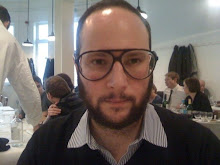

Eduardo Costa's volumetric paintings

an early work by Luis Camitzer

Eduardo Costa, Psychological Landscape 1: Rio, 2012
a memory of friend connections in Rio de Janeiro

a poster for one of Helio Oiticia's exhibition in the 70s
a Fashion Fiction screen
and Eduardo Costa at his house in Rio de Janeiro
Eduardo Costa was born in Buenos Aires in 1940. He studied Literature and Art History at the University of Buenos Aires (UBA). Early in his career, he founded and collaborated with the magazine Airón, a publication that disclosed theoretical writings, and national and international poetry and literature. Inspired by the theoretical writings and activity of Oscar Massota, he became interested in the connection between artistic practice, performance, cultural industry products and mass media as a new field for experimentation. In 1966, he wrote with Raul Escari and Roberto Jacoby Media and Communication Art, a manifesto on the new artistic materials "Un arte de los medios de comunicación” and its relation to mass media production and uses. At the same time, the three artists carried out the "Happening for a late wild boar" or "Happening of complete participation", a fictional experience that was however covered by mass media as if it had actually happened. Also in 1966, under the influence of the The Fashion System by Roland Barthes, he developed with Juan Risuela "A Fashion (Tale)". In 1967, Costa travelled to New York and presented his "Fashion Fictions" to Vogue Magazine, who published it at the beginning of 1968. In 1969, Costa wrote the manifesto "Arte útil", for Street Works. Along with Hannah Weiner and John Perrault he organized that same year, "The Fasion Poetry Event", in which artists such as Claes Oldenburgh, Andy Warhol, James Rosenquist, Marisol, Alex Katz, Marjorie Strider, and others participated. In addition, he edited the first edition of "Tape Poems" with Perreault, which consisted of 500 copies of a stereo tape with works specially created by Burton, Vito Acconci, Dan Graham and the editors, among other artists. In 1970, for the exhibition catalogue and the exhibition curated by Athena T. Spear at the Allen Art Museum, Oberlin College, Ohio, April 17 - May 12, 1970, Costa submitts the following work "A piece that is essentially the same as a piece made by any of the first Conceptual artists, dated two years earlier than the original and signed by somebody else." with which he turns around the cultural hegemony of western conceptualism. The same work is later published in Lucy Lippard's "Six Years: The dematerialization of the art object from 1966 to 1972", p. 163. In 1971, Costa returned to Argentina. In 1977, he presented Homage to Marcel Duchamp. A year later he moved to Rio de Janeiro where he was good friend of Helio Oiticica. In 1981, he returned to New York. Throughout the decade, he wrote lyrics for the rock band Virus. Since then he has been working on his Volumetric Paintings, paintings and objects made out of paint.
Eduardo Costa was born in Buenos Aires in 1940. He studied Literature and Art History at the University of Buenos Aires (UBA). Early in his career, he founded and collaborated with the magazine Airón, a publication that disclosed theoretical writings, and national and international poetry and literature. Inspired by the theoretical writings and activity of Oscar Massota, he became interested in the connection between artistic practice, performance, cultural industry products and mass media as a new field for experimentation. In 1966, he wrote with Raul Escari and Roberto Jacoby Media and Communication Art, a manifesto on the new artistic materials "Un arte de los medios de comunicación” and its relation to mass media production and uses. At the same time, the three artists carried out the "Happening for a late wild boar" or "Happening of complete participation", a fictional experience that was however covered by mass media as if it had actually happened. Also in 1966, under the influence of the The Fashion System by Roland Barthes, he developed with Juan Risuela "A Fashion (Tale)". In 1967, Costa travelled to New York and presented his "Fashion Fictions" to Vogue Magazine, who published it at the beginning of 1968. In 1969, Costa wrote the manifesto "Arte útil", for Street Works. Along with Hannah Weiner and John Perrault he organized that same year, "The Fasion Poetry Event", in which artists such as Claes Oldenburgh, Andy Warhol, James Rosenquist, Marisol, Alex Katz, Marjorie Strider, and others participated. In addition, he edited the first edition of "Tape Poems" with Perreault, which consisted of 500 copies of a stereo tape with works specially created by Burton, Vito Acconci, Dan Graham and the editors, among other artists. In 1970, for the exhibition catalogue and the exhibition curated by Athena T. Spear at the Allen Art Museum, Oberlin College, Ohio, April 17 - May 12, 1970, Costa submitts the following work "A piece that is essentially the same as a piece made by any of the first Conceptual artists, dated two years earlier than the original and signed by somebody else." with which he turns around the cultural hegemony of western conceptualism. The same work is later published in Lucy Lippard's "Six Years: The dematerialization of the art object from 1966 to 1972", p. 163. In 1971, Costa returned to Argentina. In 1977, he presented Homage to Marcel Duchamp. A year later he moved to Rio de Janeiro where he was good friend of Helio Oiticica. In 1981, he returned to New York. Throughout the decade, he wrote lyrics for the rock band Virus. Since then he has been working on his Volumetric Paintings, paintings and objects made out of paint.
























No comments:
Post a Comment